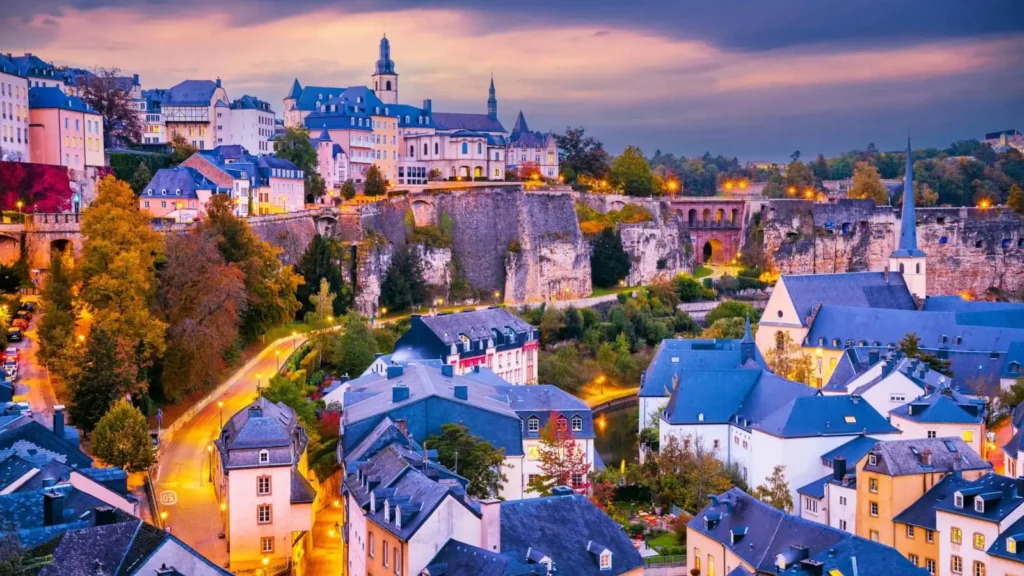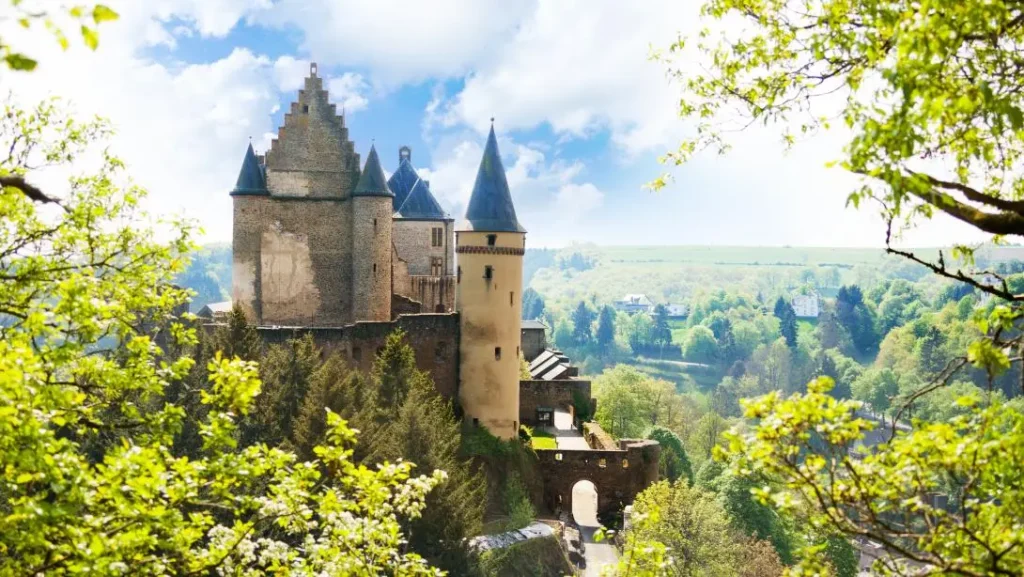In This Article
ToggleLuxembourg is a small but astonishingly prosperous landlocked country situated in the core of Europe. Renowned for its castle-studded towns, old medieval towns secured by clearly sheer cliffs, imposing casemates, and vibrant financial services hub, Luxembourg strikes a blend between cultural richness and economic strength. This article will present several of the many cultural, economic, and established aspects of Luxembourg that define its diverse identity.
A Compact Powerhouse
Luxembourg, the Grand Duchy of Luxembourg for short, is a country in the border, frontiers of Belgium, France, and Germany. Moreover, on the one hand, due to the small size of approximately 2,586 square kilometers, Luxembourg has a relatively minor impact on international and global policies. On the other hand, Luxembourg is strategically important and economically strong, especially considering its center and capital, Luxembourg City. The city’s ancient core, the Fortified Medieval OldTown, perched high atop sheer cliffs that drop off into the narrow valleys.

Historical Richness and Architectural Marvels
A Journey Through Time
Luxembourg’s history is visible in its architecture, from ancient ruins to modern structures. The country’s strategic position has bestowed it with a rich history of sieges and military importance, which is reflected in its impressive fortifications and castles.
Landmarks of Luxembourg
- The Bock Casemates: A network of underground tunnels in Luxembourg City, initially carved out by the Spanish in the 17th century, offers a glimpse into the country’s defensive strategies.
- Grand Ducal Palace: The city residence of the Grand Duke is a stunning example of Flemish Renaissance architecture and is central to the country’s political life.
- Vianden Castle: Located near the border with Germany, this restored medieval castle dates back to the 10th century and is one of the largest and most beautiful feudal residences of the Romanesque and Gothic periods in Europe.
Economic Prosperity and Innovation
Financial Hub of Europe
Luxembourg is renowned for its robust financial sector, which is one of the pillars of its economy. It is one of the largest investment fund centers in the world, second only to the United States, and a premier private banking hub in the Eurozone.
Pioneering in Information and Communication Technology
The country has also positioned itself as a leader in information and communication technology. The government’s proactive policies have encouraged the growth of IT companies and innovative startups, making Luxembourg a European center for IT security, data centers, and satellite operations.
Cultural Diversity and Linguistic Heritage
The melting pot of cultures: Being a trilingual country where Luxembourgish, French, and German are official languages, Luxembourg can be seen as a true soil of diversity due to one of its official languages is of the neighboring countries. Indeed, multilingual policy signals the openness of the country to the world and its plurality of the population. Almost half of the population of Luxembourg comprises immigrants which also makes it a nice cocktail of cultures: Festivals and traditions.
Luxembourg is a country of festivals: The country is a vivid example of a melting pot where a wide variety of festivals and traditions are celebrated. One of the most famous funfairs is Schueberfouer, conducted every summer. Also, the Echternach hopping procession is reputable and was added to UNESCO’s Intangible Cultural Heritage of Humanity. Hoping takes place on Whit Tuesday and is considered to be a popular Middle Ages’ dance procession.

Natural Splendors and Outdoor Activities
Green Heart of Europe
Despite its small size, Luxembourg is known for its lush landscapes and well-preserved natural environments. The country is dotted with forests, nature parks, and gardens, which are easily accessible to the public.
Hiking and Biking Trails
Luxembourg offers an extensive network of hiking and biking trails that crisscross the country, providing ample opportunities for outdoor enthusiasts to explore its scenic beauty. The Mullerthal Trail, also known as Luxembourg’s Little Switzerland, is particularly famous for its stunning rock formations and forested paths.
Luxembourg’s Approach to Sustainability
Commitment to Green Living
Luxembourg is committed to sustainable development and has implemented various green initiatives, including extensive public transportation networks and policies aimed at reducing carbon emissions. The country’s investment in renewable energy sources is also notable, aligning with its goal to become a leader in sustainability.
Luxembourg’s Role in Global Politics and European Affairs
Strategic Diplomatic Influence
Although small, Luxembourg is a meaningful part of the international community, notably the European Union. The country has been headquarters to various organizations, and many others operate in Luxembourg. This situation makes the country relevantin the formulation of European policies, particularly in finance and law.
Leadership in the EU
Luxembourg has provided leadership within the EU, supplying several Presidents of the European Commission and influencing EU policy across a range of issues. This leadership reflects Luxembourg’s commitment to European integration and cooperation, leveraging its multilingual capabilities and strategic position to foster dialogue and consensus among member states.
Education and Research in Luxembourg
A Hub for Academic Excellence
Indeed, Luxembourg’s investment in education and research is striking, reflected by the widespread availability of top-notch institutions and cutting-edge facilities. The University of Luxembourg stands out for its truly international orientation, featuring multilingual courses and drawing students from other European countries and overseas. Additionally, research programs in finance, law, and technology deserve much recognition, as they all relate to the country’s areas of economic advantage and high political interest.
Innovations in Science and Technology
The country is a center of various research areas, primarily in the sectors of biomedicine and eco-innovation. By closely cooperating with the public sector, the private sector continuously improves in this sphere. The government’s substantial investment in research and development promotes this tendency as well. Hence, multiple discoveries made in these fields are beneficial not only to the country but the entire scientific world.
Art and Culture in Modern Luxembourg
Flourishing Arts Scene
Culture in Luxembourg is incredibly diverse and rich, and it is reflected in numerous museums, galleries, and theaters. The Luxembourg City History museum and the National museum of History and Art reflect the magnificence of the Luxembourgish past, while various exhibitions of national and foreign artists are a testament to its modern-day artistic expression. The Philharmonie Luxembourg is a concert hall of the highest quality where multiple international music celebrations can be enjoyed.
Support for Local and International Artists
The government actively promotes cultural development through grants and programs designed to support artists from various disciplines. This support has cultivated a thriving arts community and made Luxembourg a gathering place for creative talents from around the world of gengtoto.

Sustainable Urban Development
Green City Initiatives
Luxembourg is committed to sustainable urban development, as seen in its green city initiatives which include extensive public green spaces and eco-friendly public transportation options. Luxembourg City has implemented several urban development projects that focus on sustainability, aiming to reduce traffic congestion and promote pedestrian-friendly spaces.
Investment in Public Transport
Significant investments have been made in Luxembourg’s public transport infrastructure to encourage a shift away from car dependency. In a groundbreaking move, Luxembourg became the first country to make all public transport free, which not only eases mobility but also promotes environmental sustainability.
Tourism in Luxembourg
Promoting Eco-Tourism
The natural beauty of Luxembourg makes it an ideal destination for eco-tourism. The government promotes responsible travel experiences that emphasize nature preservation and local culture. Hiking, cycling, and wine tours along the Moselle River are popular among tourists seeking to enjoy Luxembourg’s outdoors responsibly.
Culinary Tourism
Luxembourg’s culinary scene is an eclectic mix of European flavors, reflecting its cultural diversity. Food enthusiasts are drawn to its Michelin-starred restaurants and traditional eateries alike. Culinary tours that explore local wineries and breweries are increasingly popular, providing visitors with a taste of Luxembourg’s gastronomic excellence.
Embracing Luxembourg’s Multifaceted Identity
In conclusion, Luxembourg is a small country with a rich historical background, strong economy, diverse culture, and mesmerizing surroundings. Whether visitors seek to explore centuries-old castles, modern financial center, or serene rural landscapes, Luxembourg can satisfy the most demanding tastes and preferences. The small country hosts an extensive number of attractions that exemplify the European best practices while making its unique contribution to the understanding of development and innovation. It gives inspiring ideas to millions of travelers and residents and marks an exemplary way of how modernity and tradition can be combined into a prosperous model.





